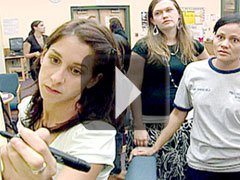Montclair State University: An Interdisciplinary Approach
It takes a university and a community.
Your content has been saved!
Go to My Saved Content.In 1908, what's now known as Montclair State University began asa modest two-year college focused on helping young women becomegrade school teachers. A hundred years later, this New Jersey institutionoffers 16,700-plus students degrees in the arts, sciences, business, andK-12 education.

Running Time: 08:15 min.
Universities such as this sometimes obscure their humble beginnings byeliminating teacher-education programs or turning them into cash cows."That has never been the case at Montclair State," says Ada Beth Cutler,dean of MSU's College of Education and Human Services, which appliesan interdisciplinary approach to innovations borne from theneeds of public schools.
The college's Center of Pedagogy, for example, is where representativesfrom the education, arts, and sciences colleges and the teachingprograms' twenty-five partner school districts gather, primarily, to makepolicy decisions about teacher preparation at MSU. The centertakes this all-hands-on-deck approach because the academic collegesand partner schools play essential roles in teacher training.
"For our students to have a vision of teaching as something that is anintellectually challenging and collaborative learning experience, they must have experiences in schools where teachers learn together," Cutler explains. Which means MSU faculty -- aside from instructing and mentoring education students -- often teach model classes and serve in residence at partner schools. In reverse,those K-12 teachers who complete courses on critical thinking,mentoring and coaching, and cultural responsiveness qualifyas clinical faculty.
All teacher candidates must complete at least one urbanfield experience early in the program. During the senior orculminating year, two semesters are usually spent in oneschool.
Guiding the students throughout their educationis the "Portrait of a Teacher," a twelve-pointdeclaration of what an educator should know anddo. It's informed by a nurturing pedagogy adaptiveto all learning styles and the notion that we live in animperfect democratic society. The "portrait" teacher is, inbrief, a community-oriented subject-area expert who advocatesfor social justice.
Teacher candidates are continually assessed for adherence tothe portrait's standards. The result is a microscopic examinationof one's strengths and weaknesses so that graduates "essentially havea portrait of themselves as teachers," says Jennifer Robinson, executivedirector of the Center of Pedagogy.

Most graduates end up working in New Jersey and, in surveys, typicallypraise their preparation; any negative feedback serves as fodder forprogram improvement -- an ongoing process that's resulted in numerousawards. One, given by the American Association of Colleges for TeacherEducation in 2002, was for MSU's work in diversifying the teaching ranks.
Recent tweaks in the program have resulted in innovations such as the digitalbackpack, a package equipped with a laptop, a digital camera, an MP3 player, and other technology tools used in partner schools by MSUstudents and cooperating teachers.
The college deliberately chooses partner schools where studentteachers are considered junior faculty and where new teachers -- alumni among them -- are nurtured and encouraged totake on leadership. It is through these partnerships, saysRobinson, that MSU underscores "the whole continuumof teacher development."
Vital Stats
- Location: Montclair, New Jersey
- Degrees conferred: Bachelor's and master's
- Annual graduating class: 700
- Time in the field: 2 semesters, plus 6 short-term placements
- Highlights:
- Center of Pedagogy, an interdisciplinary body establishing policies and practices
- "Portrait of a Teacher"
- The digital backpack